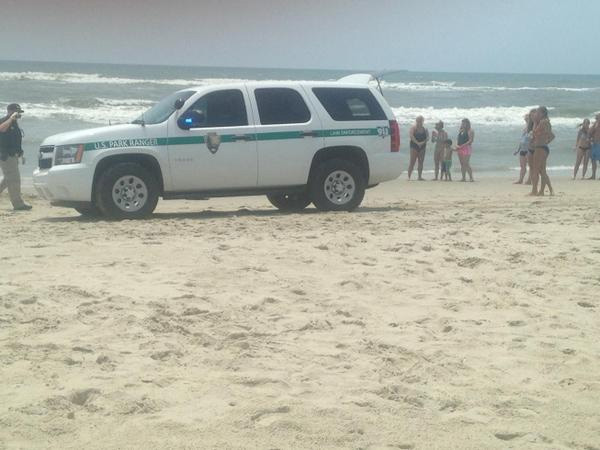OUTER BANKS, N.C. -- A third person has been attacked by a shark on the Outer Banks in just the past week.
Around 12 p.m., emergency crews responded for a reported shark bite victim on an Ocracoke beach.
The 68-year-old man was swimming in front of a lifeguard stand when he encountered a grey shark, 6 to 7 feet in length.
The shark pulled him under the water and the man sustained several bites to his rib cage, hip, lower leg, and both hands.
The man was able to swim himself close to shore where lifeguards helped him out of the water.
No other swimmers were injured.
Several beach goers shared photos on social media of the shark attack with several onlookers and first responders on the scene treating the victim.
Jackson Fuqua was at the beach and tells NBC Charlotte's sister station, 13News Now, that the man had a "baseball-sized chunk" out of his leg, just above his knee.
This is the third shark attack in the last week along the Carolina coast.
Last Friday, the National Park Service received a report of a 911 call that someone was injured by a shark about one mile north of the Avon Fishing Pier.
Hatteras Island Rescue Squad paramedics and NPS Rangers responded to the scene.
The 47-year-old victim had been swimming with others when the incident occurred. He received various injuries to his right leg and lower back.
The man was treated at the scene and then transported by ambulance and Dare Medflight to Sentara Norfolk General Hospital for further treatment.
Another man was also bitten by a shark while swimming in the surf off Hunting Island in South Carolina last Friday.
The man noticed a four-foot-long shark swimming around him and yelled, 'Shark!" only to be bitten by a second one he had not seen, according to officials.
The victim was able to get out of the water, and was taken to Beaufort Memorial Hospital with injuries that are believed to be minor.
The man was on vacation from Pennsylvania, according to officials.
The uptick in attacks — slightly above average for the year — is raising concerns about the Fourth of July holiday weekend. "I can almost guarantee there'll be a bite or two this weekend," said George Burgess, the director of the Shark Attack File.
Hyde County said it will have two ambulances with paramedic level service available with a third on call for the Fourth of July weekend.
Many of the attacks this year have occurred farther north than usual, Burgess said. South Carolina has also seen its share of attacks — three so far, he added.
In Florida, where shark attacks are more common, the 11 cases so far this year have received little attention. However, publicity about the attacks might cause swimmers to think twice this weekend.
"I bet fewer and fewer people are swimming these days, so opportunities for interactions may be diminished for a while," said Daniel Abel, a marine scientist atCoastal Carolina University.
Only one of the 24 attacks — in Hawaii — has been fatal. On average, zero to one of the shark attacks reported each year is fatal, according to the Shark Attack File.
The proximity of fisherman and swimmers was of particular concern in last weekend's attacks, Burgess told LiveScience. "Fishing off a beach where there are swimmers and surfers makes for a really bad mix," he said.
Drought conditions in the Carolinas have led to decreased fresh water runoff and thus to saltier sea water, which sharks prefer, Burgess added. According to the most recent U.S. Drought Monitor, about 65% of North Carolina and 52% of South Carolina were either abnormally dry or in drought conditions.
Baby sea turtles and menhaden fish have been more plentiful than usual, providing more attraction for the sharks, Burgess said.
The "ever-increasing amount of time spent in the sea by humans, which increases the opportunities for interaction between the two affected parties" could be one reason for the slight uptick in attacks, the Shark Attack File reported.
In addition, 24/7 news and social media coverage tends to exaggerate the danger. Bees, wasps and snakes are each responsible for far more deaths annually in the U.S. than sharks, the Shark Attack File said.
"The chances of dying ... are markedly higher from many other causes (such as drowning and cardiac arrest) than from shark attack," according to the Shark Attack File.


